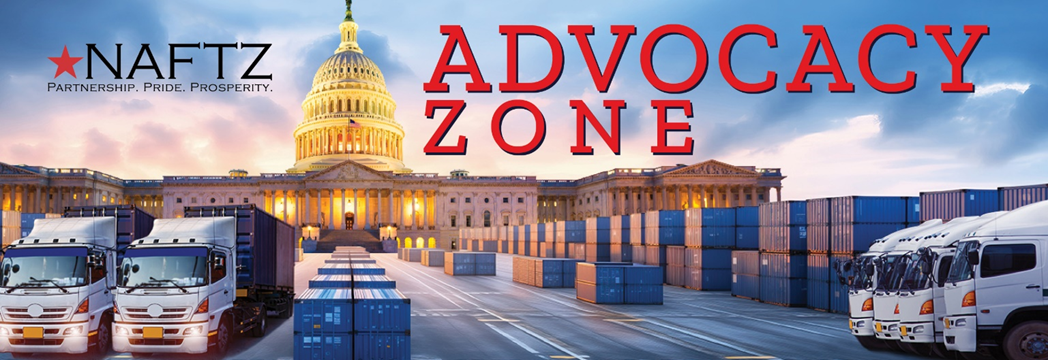The Advocacy Zone - April 2024
The Advocacy Zone - April 2024

NAFTZ Advocacy Update
Congress passed an FY24 funding package, and so attention has finally turned to FY25. NAFTZ was ready to go with our primary advocacy topic – Funding for CBP that is Directed to FTZ activities. As a follow-up to our December Virtual fly-in meetings, and our in-person Legislative Summit Hill visits in February, NAFTZ and our government relations advisor firm, Sorini, Samet & Associates, have been busy submitting appropriations requests to the individual Congressional offices with whom we have been speaking over the past months. April and May will be busy as we work on building momentum and support for these funding requests before Congress turns their attention to campaigning over the summer.
FTZ directed funding in CBP is not the only topic on which NAFTZ is currently advocating. While one of our Advocacy Working Groups is focused on CBP funding, the others are working on lots of other issues affecting FTZs. Look at their current activities and see where you can contribute!
- Petroleum/Energy Working Group – Chair Robert Balli
Working Group members are discussing drawback parity and FTZ applications related to emerging technologies in biofuels and other renewables. If you have information to share about such energy related FTZ activities, please let our Working Group chair know!
- Awareness Working Group – Chair Danielle Converse
This Working Group is drafting a letter of support for the CBP funding requests being submitted. This draft letter will be circulated amongst the offices most supportive of NAFTZ’s funding efforts as a “dear colleague letter”. Once a couple of sponsors of the letter are identified, the congressional offices can then solicit signatures of fellow members to submit in support of the request to the subcommittees that work on DHS appropriations. If you have not spoken to your Senator or Representative about the need for dedicated FTZ resources with CBP and would like help hosting them at your FTZ or telling your story, please let us know!
- Zone Operations Working Group - Chair Amy Crosse
The Operations Working Group is working with NAFTZ Executive Committee to prepare for a meeting to be held with Executive Director Thomas with CBP about once again allowing storage of goods suspected of forced labor in FTZs while the determination is made. The group is brainstorming several operational approaches that can be presented to XD Thomas to encourage CBP to reinstate this practice. If you have managed goods suspected of forced labor in your supply chain, please let us know how you did and the impact of not being able to store those goods in your FTZ.
- Manufacturing Working Group – Chair Jason Ricketts
Trade Agreement parity for FTZs is the primary advocacy topic for the Manufacturing Working Group. A Congressional office has chosen to work on this topic following a discussion held in the February Hill visits. The Working Group is collecting examples across multiple industries where lack of USMCA parity is putting U.S. manufacturing at a disadvantage. These examples are being gathered to support the efforts of the Representative’s office to introduce a bill providing FTZ parity in USMCA. This bill language is currently under review to be submitted to the Representative’s office. If you know of manufacturing operations that have moved to Canada or Mexico due to the lack of FTZ parity, please reach out to our Working Group Chair and help to tell the story!
- Distribution Working Group – Chair Dallas Hobgood
NAFTZ shared that the recently introduced Senate version of the Americas Act includes de minimis parity for FTZs. At the time of this writing, there is no such language in the House version of the Act, and a standalone bill was just introduced in the House to give de minimis parity to FTZs. Our Distribution Working Group is meeting with Representatives and researching examples of closed distribution operations in the U.S., not just those in FTZs, to be provided in support of legislative language providing FTZ parity. It is the goal of the Working Group that these examples will also provide support for parity in both chambers. All Distribution FTZs are invited to tell their story of how the lack of de minimis parity has impacted their operations and, in some cases, moved distribution offshore.
